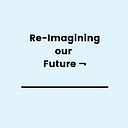Re-Imagining the Economy
As a systems thinker, and a self-identified environmentalist, we are always seeking ways to get through to the rest of the world that the planet is worth saving. But a conscious decision to destroy the planet is not the problem. The problem is complex, but one common denominator is an economic system that is self-serving rather than life-serving.
This lack of a thoughtful purpose for our global system of goods and services is no mere oversight. As Donella “Dana” Meadows (matriarch of systems theory) says, the purpose of a system is one of the highest leverage points in a given system. If the purpose is to generate the growth of profit, the system builds itself around this goal.
What would a life-serving economic system look like? How would it be different from what we have today? What would be the same? It would be dramatically, radically different. Imagine if the purpose of the global market economy were human well-being? What if every business existed to provide good jobs? What if every bank was a co-op? What if it was obvious to any financier that destroying the fabric of life on Earth was ridiculous and couldn’t imagine such behavior?
What if the majority of professions gave, more than they took, from the people in those professions, as well as from the environment? What if selflessness was incentivized instead of selfishness? Or better yet, what if there were no incentives, and people just worked for the functional benefits that the process of work provided? Or, what if people (of all ages) learned, for the sake of learning, instead of learning based on an external motivator, like taking a test or obtaining a certificate?
People that are seeking to work in conscious, environmentally friendly ways often complain that they cannot earn money and do, as Joanna Macy termed, the work that reconnects. They complain that, due to the demands of the economic system, and the need to provide for themselves, and/or their families, that they have no other option than to work jobs that they do not like and/or jobs that inherently contradict their moral compass. What if our lives were not driven by capital?
Would that mean decision makers would stop viewing children, and adults, as human capital? And, what if we did not base children’s school curriculum based on the demands of the market? But, rather on the demands, or innate characteristics, of the individual child? Do you think that would impact our relationships, and how we interact, with other people? What about ourselves, and our inner dialogue? Can you imagine a world where relationships and interaction were geared more towards transforming, rather than transacting with, one another?
This initial paragraphs in this blog relate to a blog originally published on the Systems Thinking Marin website, September 1, 2020.
Lead Author: Felicia Chavez (first three paragraphs)
Felicia I. Chavez is the director of a small, experimental nonprofit in Marin County, California, Systems Thinking Marin. The mission is to raise awareness about, and adoption of systems thinking, in Marin County, in all sectors. This involves promoting the United Nations Sustainable Development Goals of 2030, in addition to many systems thinking models. If you are interested in learning more, you can take the Systems Thinking Mini-Course, a 30-minute introduction to systems thinking.
Anchor Author: Daniel Rudolph
Dan has been living and working in different countries for the past decade. He is dedicated to re-imagining education and enabling opportunities for experiential learning and connection. One of his current passions is learning and spreading juggling.
Along with Nnaumrata Arora Singh, Dan will be co-facilitating Re-Imagining Our Future, an online course offered by the Charter For Compassion’s Education Institute, starting October 26, 2020.
